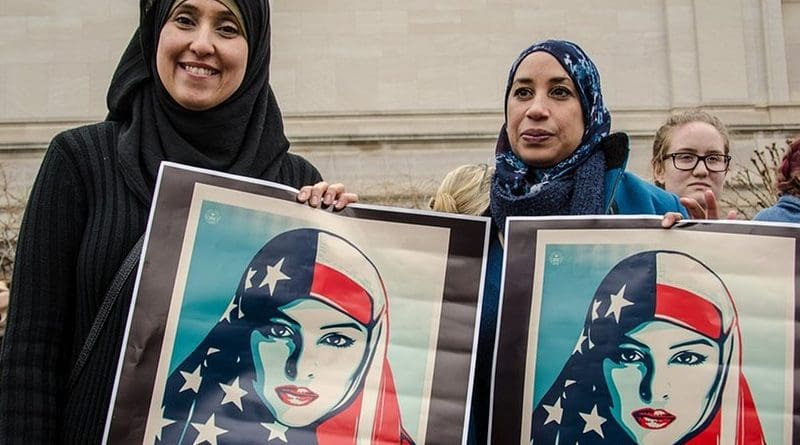Arab Americans Finally Give Themselves A Chance Of Empowerment – OpEd
By Ray Hanania
The American Arab Anti-Discrimination Committee last week launched the Arab American Business Advisory Council, which will focus on providing an important new service to the community.
The council is not “just another Arab organization” with a board and a lot of bosses with titles, which hosts dinners and parties. It has an important purpose that should not be taken for granted: It will certify businesses that are Arab-owned to help them qualify for their share of government contracts.
Each year, federal, state and local governments set aside a significant portion of the hundreds of billions of dollars of contracts needed to provide services to the American people to businesses that are recognized as minority-owned. But because Arabs are not recognized as a minority in government programs such as the US Census or the Minority Business Enterprise process, they are left out and have to compete for government business with companies with far greater resources, finances and political connections.
We keep hearing about how the federal government and some state governments are recognizing MENA — the Middle East and North Africa — as a new minority category. But all of the bills that have so far been proposed on this topic do not even mention the word “Arab.”
The Arab-American Business Advisory Council aims to fill that void. It also combines the minority designation of Arab — which is the proper way to address and identify the Arab American community — with the broader new category of MENA, in which Arabs are grouped with non-Arabs such as Persians, Israelis and Turks.
Arab Americans have been pushing for recognition as an official minority entity for decades. So, why have American governments at all levels not recognized them as such?
In America, when you are recognized as a minority, you get special privileges and considerations. One of the biggest is the requirement that you receive a portion of government contracts. These must be divided among the many recognized minorities, such as Blacks, Hispanics, Asians, Native Americans and others.
Additionally, being recognized as a minority group, which the new council will help foster, means that your community must also receive financial support in the form of grants to fund things like the creation of community centers, advertising for your newspapers and community media, and social services outreach to address health and social problems.
Most importantly, being officially recognized as a minority mandates the US government to take actions that strengthen the political and voter voice of that community. This means that, when minorities live near each other, they must be included in one political district in order to help them elect their own representatives to federal, state and local office.
Without that recognition, minorities can be politically eviscerated, as they were recently in Illinois, when the federal and state governments came together to divide the old 3rd Congressional District, partly because it had the eighth-largest concentration of Arab American voters and the potential to vote Arab Americans into Congress and the state legislature.
The 3rd Congressional District was divided into five new districts under federal redistricting laws and now, what was once a powerful Arab voter voice, which had elected one of the most outspoken pro-Arab members of Congress, Marie Newman, has become diluted and weak.
In US politics, this is called “divide and conquer.” Anti-Arab forces in the US Congress and in the state legislatures are determined to silence Arab voices, as well as those non-Arabs who stand up for Arab rights.
What the American Arab Anti-Discrimination Committee and its new business venture are doing is taking the first steps in a formal process to fight those that aim to divide and conquer the Arab American community. The council can also help bring together Arab American businesses on a national level to focus on the community’s needs, not international politics. There are about six Arab chambers in cities around the country. There should be more and they should be working together. At the moment, they are not. This council can help change that.
One of the problems in this process is that Arab Americans have never taken this issue seriously enough and fought for it. They have been consumed by bigger issues, such as fighting for the rights of Palestinians in Palestine. And they have a proud resistance to the idea of being called a minority. In the eyes of some Arabs, being called a minority is derogatory and suggests they are weak, which challenges Arab hubris and their ability to achieve. Arab Americans are achievers in almost every sphere, but not in politics or in being accepted by American society.
Politics and Palestine are more important in their eyes than issues like recognizing the needs of Arab American businesses.
What needs to happen is that, in order to more effectively fight for Palestine, the Arab American community needs to refocus its efforts on challenges that exist in America. If Arab Americans are strong and united in the US, their efforts to lobby on Middle Eastern issues will be far more effective. If they are strong, cohesive and together, their voices can be far more powerful and effective in addressing both foreign affairs and Arab American empowerment.
That is why the launch of the Arab American Business Advisory Council is probably one of the most important announcements that has been made in the community since Arabs first said they wanted to be counted in the US Census 50 years ago.

